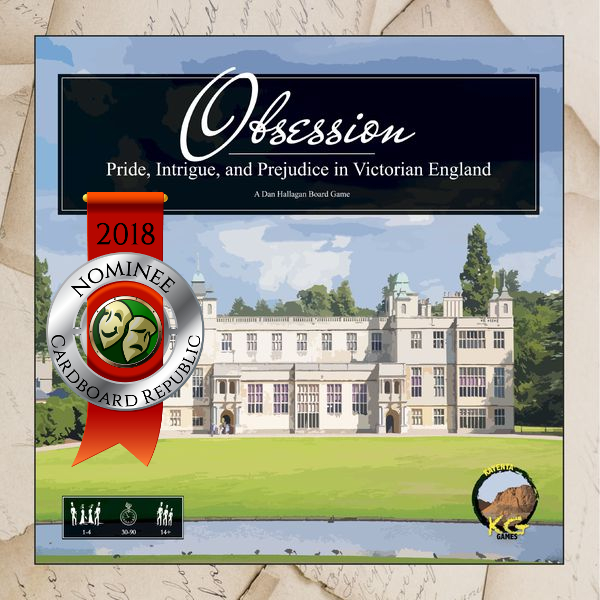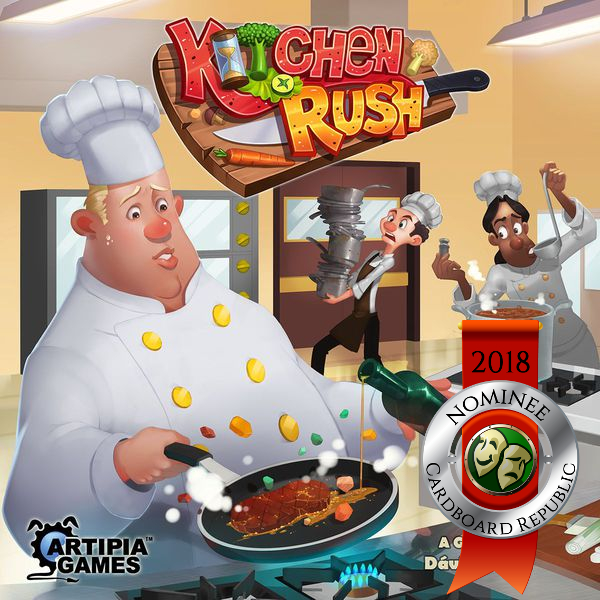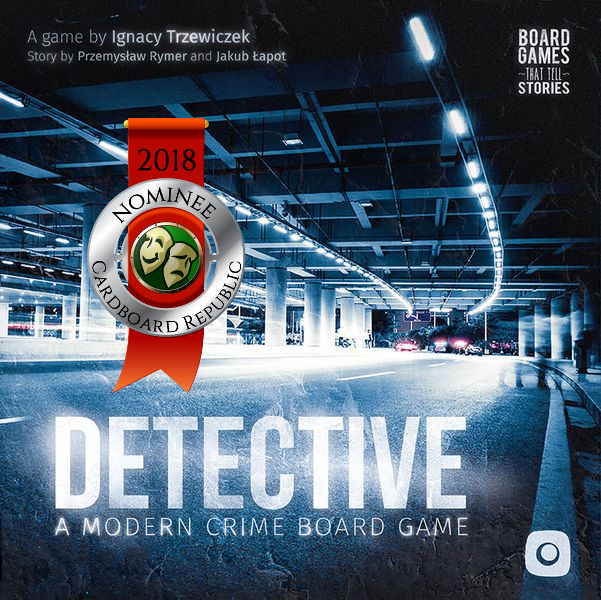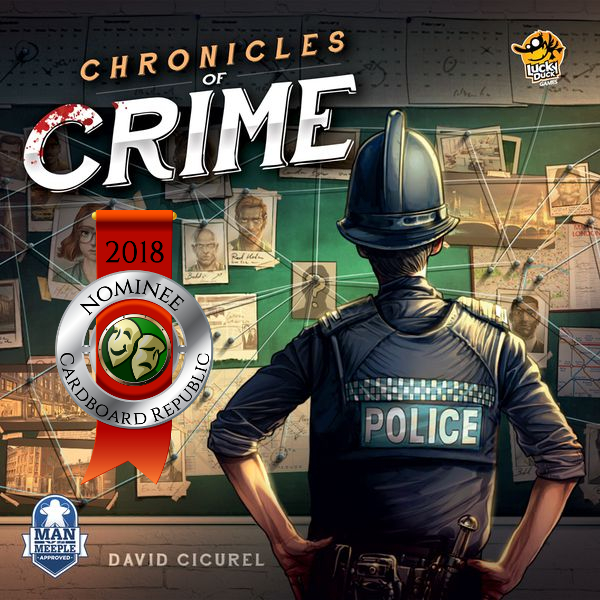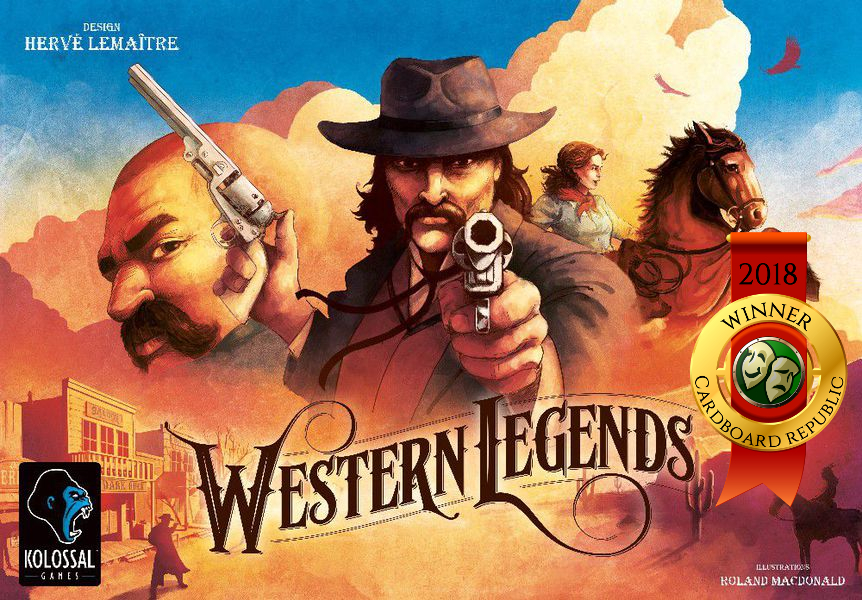The Cardboard Republic has rolled out the annual Laurels of the Republic awards, celebrating the best new games released in 2018 for each of the gamer archetypes. What follows are the finalists for one of those groups.
 From the depths of a cavernous dungeon, to the cold reaches of a distant conflict in outer space, to the exploration of the human condition, Immersionists thrive on a game’s setting. This group gets its biggest enjoyment out of games with rich settings that either tell some kind of story or serve some kind of purpose – games existing solely on basic mechanical or tactical choices are their kryptonite. Their driving interest revolves more around whether a particular mechanic or component fits whatever narrative is being told than if it’s the most ideal option. Immersionists want to be part of the game and feel as if their character belongs there. These roleplayers and worldbuilders demand that flavor actually matter to hold their interest – something more designers have been taking to heart in recent years.
From the depths of a cavernous dungeon, to the cold reaches of a distant conflict in outer space, to the exploration of the human condition, Immersionists thrive on a game’s setting. This group gets its biggest enjoyment out of games with rich settings that either tell some kind of story or serve some kind of purpose – games existing solely on basic mechanical or tactical choices are their kryptonite. Their driving interest revolves more around whether a particular mechanic or component fits whatever narrative is being told than if it’s the most ideal option. Immersionists want to be part of the game and feel as if their character belongs there. These roleplayers and worldbuilders demand that flavor actually matter to hold their interest – something more designers have been taking to heart in recent years.
And with that, here are The 2018 Laurel Finalists for Immersionists:
Honorable Mention: Holding On: The Troubled Life of Billy Kerr
Publisher: Hub Games | Players: 2-4 | Play Time: 45-60 Minutes
For all their focus on mechanics and rules, most board games exist, at least in part, as a work of artistic fiction. You can put a game in any setting, any time period, on any plane of existence. From the inner workings of a human cell to an alien planet 10,000 years in the future, a game’s theme is limited only by its designer’s imagination.
Mostly.
Because richness of expression aside, at the end of the day games are still a product to be sold, and a publisher has to consider whether someone will want to play a game it. The traditional thought has been that more serious or experimental ideas weren’t salable, but as the hobby has grown, so too has the appeal for exploring new horizons.
Including, as it turns out, a game about a man living out the final days of his life.
That is the gist of Holding On: The Troubled Life of Billy Kerr, a linked campaign-style Co-Op wherein players are medical staff trying to ease the suffering of the mysterious middle-aged Billy Kerr. Holding On begins with poor Billy showing up at the ER following a massive heart attack and hammers forth its stark premise right from the onset: Billy’s condition is terminal and he is going to die. There is no changing or altering that course. However, he is still burdened with unresolved issues from his past. Your group’s task over the course of the game’s story, broken down into 10 scenarios, is to provide the best care possible. Collectively, you must split your time and resources between providing adequate medical care to keep him comfortable while also building trust via palliative efforts to get him to open up and share the memories he’s, well, holding on to.
Holding On has solid gameplay potential, mixing both familiar mechanical elements with an inventive card-based matching system as you plumb the depths of Billy’s memory to uncover his past. Above all, Holding On carefully threads the needle of its theme, stitching together a game that’s both rewarding, and yes, at times, sobering, but also abstracted just enough to be neither overwhelming nor dismissive of its core premise.
It’s fitting, if even perhaps a bit ironic, that the best way to describe Holding On is an ambitious game with a unique theme and a lot of heart. Which, for Immersionists, is highly desirable prognosis.
The Nominees

Number Five: Obsession
Publisher: Kayenta Games | Players: 1-4 | Play Time: 45-100 Minutes
Welcome to your very own Downton Abbey, set at the height of Victoriana.
In this amusingly flavorful worker allocation game, each player belongs to an illustrious elite family in the mid 1800s whose coffers have fallen on hard times after several decades of relative prosperity. As luck would happen, an influx of moneys coincides with the arrival of two wealthy heirs to the Fairchild fortune have arrived in the region to live with their aunts. Sensing the opportunity to climb back up in social standing, each player’s family decides that marrying off one of their own to the Fairchilds would be the perfect ticket back into society’s former graces. Thus begins the long and rigid process of a Victorian-era courtship.
Over a dozen or so turns, roughly equating to four seasons, you are trying to earn the favor of a Fairchild suitor. This is mostly accomplished by selecting an activity space within the confines of your run-down country estate. A proper hosting of said activity requires the commitment of the correct type and number of attendees for that event, represented via cards in your hand, as well as the appropriate type and number of workers from your household staff to commit those the event. Afternoon tea in the garden? A rousing pheasant hunt? Some sitting around the parlor with your dowager in-laws? What thrills!
Not to rest on your existing pitiful station, successfully hosted events encourage you to immediately reinvest your rewards – be it reputation, attendee cards, or income – into further renovating your estate, thus perpetuating a cycle of conspicuous spending and chasing coattails. But hey, at least now you have a tennis court.
Really, no one can do a backhanded compliment like the British.
Obsession is an enjoyable take on Victorian high society that’s equal parts homage and satire, where the downtrodden well-to-do attempt their scheme their way back into status by spending themselves further into debt. With laid-back pacing and the degree to which it fully embraces its slightly absurdist theme, Obsession is one traditional-styled Euro that, for Immersionists, is a fine bit of beer and skittles indeed.
Number Four: Kitchen Rush
Publisher: Stronghold Games / Artipia Games | Players: 1-4 | Play Time: 30-45 Minutes
Order up!
Few work places are as frenetic as a bustling restaurant. From laser-focused chefs on their culinary creations, to wait staff juggling to get meals to their guests, to frantic bussers cleaning tables to make way for the next patrons, a busy restaurant is bound to be chaotic. The trick is how well you can manage, mitigate, and cope with, that degree of pressure.
Several games exist that are based around food service and food delivery, but none truly embody the real-time mania of a lively eatery. That is, until Kitchen Rush.
In this delicious cooperative worker placement game, each player is a member of a local restaurant trying to make it as prosperous as possible by providing top-notch service and promptly delivered meals.
The key word here is try.
Kitchen Rush is played over four rounds of 4 minutes each, all in real-time. Pre-round discussion is essential, but once it begins, it’s up to the group to work together to accomplish their goals with little room for breaks. Each player has two workers in the form of sand timers, which are flipped as soon as you use an action such as taking food orders, gathering ingredients, or washing dishes. Capturing the essence of impatiently waiting to jump to your next task, a worker cannot be moved until its sand runs out. Properly cooked meals are the most pressing focus of a round, as completed orders are what gets you income to pay your workers and / or important Prestige Stars.
And by the end…you really do want those stars.
Both the thrill and its challenge of Kitchen Rush reside in the hectic process by which everyone is trying to do their part for the group, with hands crisscrossing the board and everyone verbally calling out what they need help with.
Kitchen Rush wonderfully and authentically encapsulates the rewards and frustrations of maintaining a restaurant. And it’s impressively achieved not through deep strategy or rules complexity but by producing an energetic and highly thematic simulation of the real deal. Which, naturally, immersionists are just bound to eat up.
Number Three: Detective: A Modern Crime Board Game
Publisher: Portal Games | Players: 1-5 | Play Time: 120-180 Minutes
It’s about time you showed up, recruit. We’ve got a brand new case for you, and you have 3 days to solve it before the commissioner throws a fit.
Detective is largely billed as a 21st rendition of Century Sherlock Holmes: Consulting Detective, and in a lot of ways this is accurate. Much of the framework established by the classic 1980’s story-based deduction game is intact, from scenario-based crimes to using your deductive reasoning to decide your next step. Detective improves on this significantly by making it more relatable and interactive.
In this co-op game, players are members of a new investigative agency known as Antares. Your goal in each scenario is to solve the mysterious crime within the time allotted to you. And you always have less of it than you want. Therefore, your group has to determine how to best spend your time, which involves deciding which locations to visit, people to talk to, forensic tests to run, and knowing when to press your luck on certain investigative paths. Detective adds modernity and higher immersive standards by controlling most of this through an actual Antares website, giving you a flavorful sense that you actually are working for a modern day agency. Every decision you make, fruitful or not, unveils a rich tapestry of storytelling as you wind your way to the story’s inevitable conclusion.
Even if some of those story elements are just sipping coffee and waiting around for tests to finish. But hey, that’s what real investigative police work often is. Sorry every TV procedural ever.
Like its predecessor, each scenario in Detective is lengthy and involved, dropping incremental pieces of story at your feet and tasking you with filling in the blanks on your own. With all the twists and turns of real criminal cases and ample room to flex your little grey cells, Detective doesn’t just tell you an unfolding story – it puts you squarely in the middle and then gives you the wheel. And for world-building Immersionists, that’s one heck of a lead they can’t pass up.
Number Two: Chronicles of Crime
Publisher: Lucky Duck Games | Players: 1-4 | Play Time: 60-90 Minutes
Chronicles of Crime is the second of two detective-based co-op games on this year’s list, and that’s less of a statement about parallel game design or coincidental releases of worthwhile games with overlapping theme than it is about how two games both managed to embody the same idea exceedingly well while managing to do so in very different ways.
Chronicles, like Detective, is a scenario-driven cooperative game about crime investigations. In this one you’re part of the illustrious Scotland Yard and your group is (naturally) tasked with tracking down clues, interviewing witnesses, traveling to different locations, and ultimately trying to gather as much evidence as possible to solve your case before time runs out. Likewise, Chronicles also integrates modern technology into its gameplay, but it does so very differently. Whereas Detective uses a website to engender the theme of being part of an institutional criminal investigation agency, Chronicles of Crime focuses on a boots-on-the-ground approach by injecting you into the crime scenes themselves.
See, in this game, you quite literally explore a crime scene on a mobile device.
Using a full-fledged game app, Chronicles of Crime experiments with much success on incorporating low-level VR technology into a board game. Through it, one player can explore a given crime scene for clues, however innocuous, and then convey what they see to the rest of the team from a first-person perspective. In turn, the group must decide which clues to investigate, experts to call, and places to visit based on those preliminary observations and subsequent results. All of this is done via scanning QR barcodes into the app, which creates an incredibly open-ended means of interrogating witnesses and deciphering whether a potential clue has any lasting importance to your case…or not.
Chronicles of Crime deftly incorporates mobile technology into the heart of its game, and while that certainly could have resulted in mere gimmickry, Lucky Duck found that delicate balance of using tech to accentuate the thematic experience of solving crime without having it overpower everything else the game is offering. And it works. It’s inventive, innovative, engaging, and challenging, and yet its approachable scan-and-go process has anyone feel like they can help crack the case in a way that Immersionists will find hard to resist.
Because of all this, Chronicles of Crime was a front-runner for quite some time, but was ultimately edged out by another game where the decision is up to you whether you want to solve crimes…or cause them.
The Winner
2018 Immersionist Laurel – Western Legends
Publisher: Kolossal Games | Players: 2-6 | Play Time: 60-90 Minutes
This one was really close, but Western Legends pulled it out. It’s been a much lauded game since its original Kickstarter and with a very good reason: it’s warranted as much as an outlaw on the lam.
Travel back in time to the fabled Old West, where talk is cheap and grit is a way of life. Over the course of this game, players are given the opportunity to explore the lands in and around two fictional towns. With a handful of actions available to you each turn, your ultimate objective is to attain the most renown via victory points, which, thanks to its open-ended nature, is provided via a host of opportunities to that end.
Through a mix of specialized poker cards, player choices, and story-based elements reinforcing the game’s theme, you can choose from a number of flavorful point-getting options, from rustling cattle, to mining gold, to rooting out bandit gangs, to robbing banks and fighting other players. In this game, all paths lead to points, regardless of whether your hat is black, white, or something in between, and the game exhibits equal parts points race and world exploration. Though while the destination here is certainly important, thanks to its breadth of options and inspired flavor, you could argue that Western Legends champions the journey even more so. That alone is enough to entice most Immersionists.
Western Legends accomplishes something that few games have tried, and even fewer have done successfully: create a highly thematic sandbox-style game set in the Old West. In many ways, Western Legends is like a silver screen movie where the script hasn’t been written yet, letting players fill in the blanks as they wander through the world at their own pace. Through a bevy of player-driven choices, a multi-use card system that forces frustrating-yet-rewarding decision making, and the inclusion of nearly as many Western tropes as a John Ford classic, Kolossal Games has crafted a delightfully thematic rust-colored tapestry of dust and danger that is definitely worth exploring. And boy howdy it’s for that reason why Western Legends has rightfully earned this group’s Laurel.
![]()
Western Legends Contest!
We thought about different ways to highlight how great the winning title of the Immersionist Laurel is. We tried to come up with some clever and thematic ideas, such as buying up an old ghost town to establish as the country’s first permanent gaming village or sitting down and watching the top 20 Western-themed movies of all time in the order of how grizzled and grumpy the main characters are. But then we remember that those sort of things would take a lot of time and money. Also, the Wild West was pretty dusty. And dangerous. So we’ve opted for a simpler approach instead: providing one lucky winner with the opportunity to enjoy the award-winning game first hand.
That’s right! Enter below for your chance at your very own copy of Western Legends!
Note: In honor of their award recognition, Kolossal Games has kindly provided a copy of this game for giveaway purposes.
![]()
Be sure to check out the 2018 Laurel Award pages for the other archetypes once they go live!


